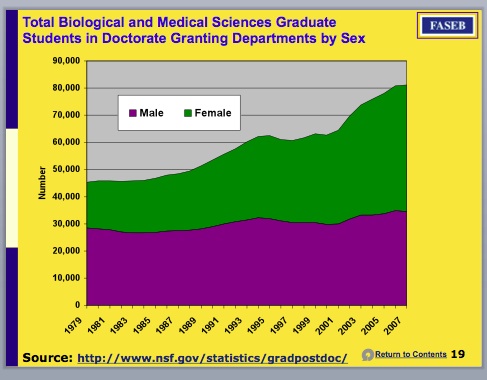The biomedical field is feeling crowded. I blame women. And the data back me up:

This slide is from FASEB, which compiled a bunch of helpful graphs based on various sources of data about the biomedical sciences job market.
It's clear that back in 1979, a guy could get ahead fairly easily in this business, but now, more than half of biomedical sciences grad students are women. Male enrollment has remained about constant at 30,000. (Please don't send me hate mail - I realize that women aren't nearly as well represented at higher levels of the career ladder, and I'm not trying to make light of the career challenges women face. If we had kept the number of grad students constant, I'm sure talented women would still be edging out men on this graph.)
The real point of this post is not about gender representation. It's about the very large growth in the biomedical grad student/postdoc population. The real kicker comes later in the FASEB slides - tenure and tenure track positions have remained fairly constant over the last 25 years.

This isn't news, but it bears repeating. To my mind, the issue here is that we're putting a lot of people through lengthy PhD programs unnecessarily, because many of the non-tenure track jobs which PhD graduates are taking don't really require a 7-year PhD (often followed by a multi-year postdoc).
We need a clear alternate career path for people who want to work in the biomedical sciences, that doesn't require such a long and unfocused training process, analogous to a career in engineering in other fields. If you could work in a technically challenging, decently-paid biomedical career after only 2-3 additional years of post-college training, would you choose that or the current graduate career track? If this kind of thing were available, I think more people would choose it.
Read the feed:






Comments